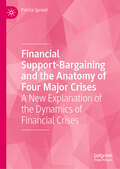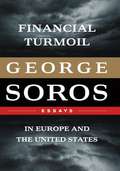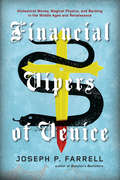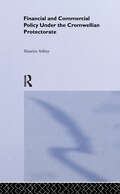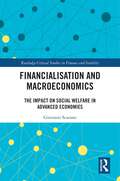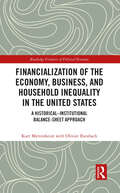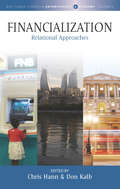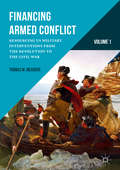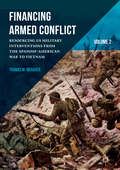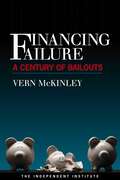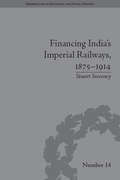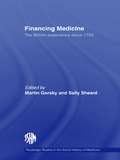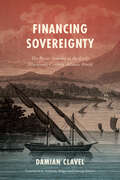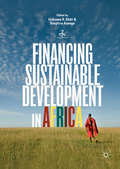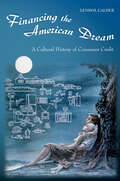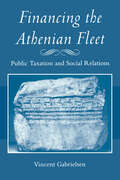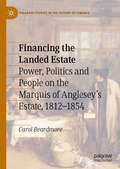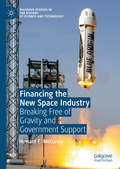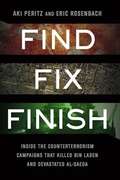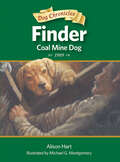- Table View
- List View
Financial Support-Bargaining and the Anatomy of Four Major Crises: A New Explanation of the Dynamics of Financial Crises
by Patrick SpreadThis book takes a detailed look at four major financial crises—the twin crises of the South Sea Bubble in Britain and the Mississippi Bubble in France in 1720; the Great Crash of 1929 and the subsequent Great Depression; and the Global Financial Crisis of 2007-9. It traces the evolution and causes of the crises by reference to a theory of support-bargaining and money-bargaining, set out in earlier work, but reintroduced here with specific reference to financial crises. Two early chapters focus on theoretical issues. The work of prominent theorists, including John Law and J. M. Keynes, is evaluated. A fundamental problem of neoclassical theory is its failure to accommodate time disparities, and consequent credit requirements, in economic transactions. This has necessitated theoretical separation of a &‘real economy&’ from financial markets. The separation renders neoclassical economists blind to financial services, and hence to the dynamics of financial crises. In support-bargaining and money-bargaining, the &‘real economy&’ and financial services are seamlessly linked. The book shows how the theory of support-bargaining and money-bargaining provides a clear and consistent explanation of the incidence of financial crises. Since financial crises are not exceptional events, the wider aim of the book is to convince social scientists that, in explaining financial crises, the theory of support-bargaining and money-bargaining provides also a superior explanation of the functioning of economies and societies in quieter times. It will appeal particularly to those many economists who find the prevalent neoclassical model of economic transactions inconsistent with the observable functioning of economies.
Financial Turmoil in Europe and the United States: Essays
by George SorosThe dire economic situation we find ourselves in is not a result of economic forces alone, but of the policies pursued, and not pursued, by world leaders. In this collection of his recent writings on the global financial situation, George Soros presents his views and analysis of key economic policy choices leading up to, during, and following the financial crisis of 2008-2009. Soros explores domestic and international policy choices like how to manage the (then) potential implosion of Fannie Mae & Freddie Mac, deploying measures to stem global contagion from the sub-prime crisis, alternative options on bailing out lesser developed countries and why this was vital, the structural problems of European economic management, and more. Financial Turmoil in Europe and the United States elegantly distills the choices at hand, and takes the reader on a journey of real time economic policy work and experimentation.
Financial Vipers of Venice
by Joseph P. FarrellIn this sequel to Babylon's Banskters. The banksters have moved from Mesopotamia via Rome to Venice. There, they have manipulated popes and bullion prices, clipped coins, sacked Constantinople, destroyed rival Florence, waged war, burned "heretics" and suppressed hidden secrets threatening their financial supremacy... until Giordano Bruno and Christopher Columbus, broke the banking cartel's control of information and bullion...
Financial and Commercial Policy Under the Cromwellian Protectorate
by Maurice AshleyFirst Published in 1972. Routledge is an imprint of Taylor & Francis, an informa company.
Financialization and Macroeconomics: The Impact on Social Welfare in Advanced Economies (Routledge Critical Studies in Finance and Stability)
by Giovanni ScaranoFinancialisation has become a widely discussed and debated term leading to a plurality of perspectives, but no fixed definition or single reading. This book presents a critical exploration and review of the current literature on financialisation, focusing on the financialisation of NFCs and its possible implications for the macroeconomic and financial stability of advanced countries. Starting from this critical analysis, it proposes some new readings of the process of financialisation, linking it directly, on the one hand, to the evolution of interest-bearing capital and the credit system, and, on the other hand, to the historical tendencies of monopoly capital towards financial arrangements to manage corporate control. Finally, a conceptual scheme for interpretation and a mathematical model of corporate portfolio choice is developed to explain how the tendency in developed countries to place growing shares of social surplus in speculative financial channels can contribute to their long-term real stagnation. The book also underlines the excessive attention usually being paid to some micro-epiphenomena that show a fallacy of composition at the macroeconomic level and can lead to some misunderstandings of the general trends in capitalist evolution. Moreover, some doubts are raised about the extent to which financialisation actually represents a change to the present regime of accumulation. The book targets all the scholars who are interested in better understanding whether financialisation constitutes a profound change in the functioning of capitalist economic systems and what effects it can produce in social welfare in the advanced countries.
Financialization of the Economy, Business, and Household Inequality in the United States: A Historical–Institutional Balance-Sheet Approach (Routledge Frontiers of Political Economy)
by Kurt Mettenheim Olivier ButzbachThis second volume on the political and social economy of financialization in the US focuses on the consequences of the rise of finance for the American macroeconomy, household inequality, and the management of nonfinancial business enterprises. A historical–institutional balance-sheet approach to long-term trends and recent change in the US reveals a series of anomalies and provisos for critical, heterodox, and mainstream economic approaches and provides new perspectives on debates about political economic change in advanced economies since the 2007–2008 financial crisis. This book marks a significant contribution to the literature on financialization and studies in social economics, household economics, the structure and management of nonfinancial business enterprises, and American political economy.
Financialization: Relational Approaches (Max Planck Studies in Anthropology and Economy #6)
by Don Kalb Chris HannBeginning with an original historical vision of financialization in human history, this volume then continues with a rich set of contemporary ethnographic case studies from Europe, Asia and Africa. Authors explore the ways in which finance inserts itself into relationships of class and kinship, how it adapts to non-Western religious traditions, and how it reconfigures legal and ecological dimensions of social organization, and urban social relations in general. Central themes include the indebtedness of individuals and households, the impact of digital technologies, the struggle for housing, financial education, and political contestation.
Financing Armed Conflict, Volume 1
by Thomas M. MeagherThis first part of a two-volume series examines in detail the financing of America's major wars from the American Revolution to the Civil War. It interweaves analyses of political policy, military strategy and operations, and war finance and economic mobilization with examinations of the events of America's major armed conflicts, offering useful case studies for students of military history and spending policy, policymakers, military comptrollers, and officers in training.
Financing Armed Conflict, Volume 2
by Thomas M. MeagherThis second part of a two-volume series examines in detail the financing of America's major wars from the Spanish-American War to the Vietnam War. It interweaves analyses of political policy, military strategy and operations, and war finance and economic mobilization with examinations of the events of America's major armed conflicts, offering useful case studies for students of military history and spending policy, policymakers, military comptrollers, and officers in training.
Financing Failure: A Century of Bailouts
by Vern McKinleyDuring the recent financial crisis no issue has aroused more passion than financial institution bailouts.The standard rationale for the bailouts has been one of necessity and fear: federal regulatory agencies must have more authority in order to respond to the crisis, or else the public will face terrible consequences. But does this rationale hold up to close inspection? In Financing Failure, Vern McKinley approaches the topic by examining the policy decisions behind the bailouts and by showing their connection to previous government interventions. He brings under scrutiny the policy decisions made by the Treasury Department, the Federal Reserve, and the FDIC during the crisis of the 2000s and links them to policies that go back as far as the 1930s. This history of bailouts reveals that the genesis of financial crisis is government policy, be it the mismanagement of monetary policy during the 1930s or the political push to expand homeownership that helped cause the 2000s crisis. The nation&’s federal financial regulators and the politicians claim to have saved the American economy. In truth they have done everything within their power to expand their own influence—often far out of view from the public and media. Instead of openly explaining their actions, the bailout agencies have attempted to prevent the public from reviewing their decision-making, often at tremendous cost to taxpayers. McKinley&’s painstakingly researched and clear-headed analysis of bailouts and government intervention shows that the American public has accepted too many official pronouncements at face value, and that reining in the federal regulators is a necessary step toward truly promoting the safety and soundness of the financial system.
Financing India's Imperial Railways, 1875–1914 (Perspectives in Economic and Social History #14)
by Stuart SweeneyThe Indian railway network began as a liberal experiment to promote trade and commerce, the distribution of food and military mobility. Sweeney's study focuses on Britain's largest overseas investment project during the nineteenth century, offering a new perspective on the Anglo-Indian experience.
Financing Medicine: The British Experience Since 1750 (Routledge Studies in the Social History of Medicine #Vol. 24)
by Martin Gorsky Sally SheardFinancing Medicine brings together a collection of essays dealing with the financing of medical care in Britain since the mid-eighteenth century, with a view to addressing two major issues: Why did the funding of the British health system develop in the way it did? What were the ramifications of these arrangements for the nature and extent of health care before the NHS? The book also goes on to explore the 'lessons' and legacies of the past which bear upon developments under the NHS. The contributors to this volume provide a sustained and detailed examination of the model of health care which preceded the NHS - an organization whose distinctive features hold such fascination for the scholars of health systems - and their insights illuminate current debates on the future of the NHS. For students and scholars of the history of medicine, this will prove essential reading.
Financing Sovereignty: The Poyais Scandal in the Early Nineteenth-Century Atlantic World
by Damian ClavelFinancing Sovereignty rewrites the story of one of the great financial frauds of the nineteenth century: Gregor MacGregor, a Scottish mercenary and self-proclaimed cacique of Poyais, borrowed massive sums on the City of London's burgeoning South American sovereign debt market by selling bonds of the State of Poyais. The only problem—Poyais did not exist. At least, that is what MacGregor was quickly accused of by the press and public opinion at the time. From then on, MacGregor has embodied the figure of the swindler par excellence, the con artist behind the most audacious financial fraud in history. In Damian Clavel's deeply researched retelling of the Poyais story, MacGregor is less an unscrupulous adventurer aiming to defraud English investors than a luckless intermediary between Indigenous Miskitu elites and British financiers. From the coasts of Moskitia to the trading floors of London, Clavel traces the genesis, development, and downfall of the Poyais project, detailing how these events were the outcome of a failed attempt to finance the making of a new country in Central America. A microhistory set against the backdrop of global history, Financing Sovereignty offers a new lens through which to view the political, economic, legal, and social dynamics of the nineteenth-century revolutionary, financial, and imperial transformations that took place across the Atlantic.
Financing Sustainable Development in Africa
by Uchenna R. Efobi Simplice AsonguThis edited volume provides a critical evaluation of financing options for sustainable development in Africa. While sustainability has long been the watchword for development programs, and while many African countries have taken initiatives to develop integrated frameworks that tackle developmental challenges—including poverty, education, and health—financing has remained a challenge. In this book, an expert team of chapter authors examines new financing options while also exploring how traditional financing means, such as foreign aid and foreign direct investment, can be more effective for sustainability. The authors discuss how African nations can build adequate structures and productive capacity to create a platform that can meet present economic, social, and environmental needs without compromising the ability of future generations to meet their own needs. Practical case studies and scientific evidence give this book a unique approach that is both qualitative and quantitative. This book will be of interest to students, practitioners, and scholars of development studies, public policy and African economics.
Financing the American Dream: A Cultural History of Consumer Credit
by Lendol CalderOnce there was a golden age of American thrift, when citizens lived sensibly within their means and worked hard to stay out of debt. The growing availability of credit in this century, however, has brought those days to an end--undermining traditional moral virtues such as prudence, diligence, and the delay of gratification while encouraging reckless consumerism. Or so we commonly believe. In this engaging and thought-provoking book, Lendol Calder shows that this conception of the past is in fact a myth. Calder presents the first book-length social and cultural history of the rise of consumer credit in America. He focuses on the years between 1890 and 1940, when the legal, institutional, and moral bases of today's consumer credit were established, and in an epilogue takes the story up to the present. He draws on a wide variety of sources--including personal diaries and letters, government and business records, newspapers, advertisements, movies, and the words of such figures as Benjamin Franklin, Mark Twain, and P. T. Barnum--to show that debt has always been with us. He vigorously challenges the idea that consumer credit has eroded traditional values. Instead, he argues, monthly payments have imposed strict, externally reinforced disciplines on consumers, making the culture of consumption less a playground for hedonists than an extension of what Max Weber called the "iron cage" of disciplined rationality and hard work. Throughout, Calder keeps in clear view the human face of credit relations. He re-creates the Dickensian world of nineteenth-century pawnbrokers, takes us into the dingy backstairs offices of loan sharks, into small-town shops and New York department stores, and explains who resorted to which types of credit and why. He also traces the evolving moral status of consumer credit, showing how it changed from a widespread but morally dubious practice into an almost universal and generally accepted practice by World War II. Combining clear, rigorous arguments with a colorful, narrative style, Financing the American Dream will attract a wide range of academic and general readers and change how we understand one of the most important and overlooked aspects of American social and economic life.
Financing the Athenian Fleet: Public Taxation and Social Relations
by Vincent GabrielsenTo meet the enormous expenses of maintaining its powerful navy, democratic Athens gave wealthy citizens responsibility for financing and commanding the fleet. Known as trierarchs—literally, ship commanders—they bore the expenses of maintaining and repairing the ships, as well as recruiting and provisioning their crews. The trierarchy grew into a powerful social institution that was indispensable to Athens and primarily responsible for the city's naval prowess in the classical period.Financing the Athenian Fleet is the first full-length study of the financial, logistical, and social organization of the Athenian navy. Using a rich variety of sources, particularly the enormous body of inscriptions that served as naval records, Vincent Gabrielsen examines the development and function of the Athenian trierarchy and revises our understanding of the social, political, and ideological mechanisms of which that institution was a part. Exploring the workings, ships, and gear of Athens' navy, Gabrielsen explains how a huge, costly, and highly effective operation was run thanks to the voluntary service and contributions of the wealthy trierarchs. He concludes with a discussion of the broader implications of the relationship between Athens' democracy and its wealthiest citizens.
Financing the Landed Estate: Power, Politics and People on the Marquis of Anglesey’s Estate, 1812–1854 (Palgrave Studies in the History of Finance)
by Carol BeardmoreWhile there is an extensive historiography which explores English agriculture in the nineteenth century, there has been less attention paid to individual estates and in particular the role of the land agent within their management, administration and participation in rural community relationships. Nowhere is this more obvious in the lack of research into the financial history of the landed estate, even though in the early nineteenth century these were some of the largest businesses in England. The Castleman letters are a rich source which detail the intricate working, financial, social and political relationships which constituted the foundation of the landed estate. The vouchers of which more than 10,000 have survived alongside the rental accounts have rarely been examined. On their own they illustrate, for example: the sums paid out on maintenance, the interest payments on mortgages, charitable expenditure, spending on property repairs and one-off payments for a wide and diverse range of items. Together with the diurnal correspondence all three aspects of the archive detail the daily financial undertakings and form the foundation of a new financial history of the estate. This book will show that estate management was underpinned by an inherent understanding of the financial decisions which needed to be taken, and will be of interest to academics and researchers of financial history.
Financing the New Space Industry: Breaking Free of Gravity and Government Support (Palgrave Studies in the History of Science and Technology)
by Howard E. McCurdyThis Palgrave Pivot investigates the efforts of five aerospace companies—SpaceX, Blue Origin, Virgin Galactic, Orbital Sciences, and the Boeing Company—to launch their entry into the field of commercial space transportation. Can private sector firms raise enough capital to end the usual dependence on government funding? What can historical examples of other large-scale transportation initiatives, such as the first transcontinental railway and the first commercial jetliner, teach us about the prospects of commercial space flight? As Howard E. McCurdy shows, commercializing space is a great experiment, the outcome of which will depend on whether new space entrepreneurs can attract support from a variety of traditional and nontraditional sources.
Finch's Fortune
by Mazo De La RocheFirst published in 1932, in Finch’s Fortune, Finch Whiteoak celebrates his twenty-first birthday and comes into his inheritance from Grandmother Adeline. He generously takes his elderly uncles to England and lives for a time with his Aunt Augusta. While in England, Finch falls in and out of love with his cousin Sarah Court. He returns to Jalna, where the fortune left to him remains a bone of contention amongst other members of the Whiteoak family. This is book 9 of 16 in The Whiteoak Chronicles. It is followed by The Master of Jalna.
Find Me Again: A Rebecca Temple Mystery
by Sylvia Maultash WarshWinner of the 2004 Edgar Allan Poe Award for Best Paperback Original, short-listed for the 2004 Anthony Award for Best Paperback Original and for Best Historical Mystery Still coming to terms with the death of her husband, Dr. Rebecca Temple tries to continue her practice and carry on with life as usual. She meets a charming Polish count who has written a historical novel based on his own family. During a visit to his home, she discovers a murder and soon realizes that the count’s manuscript may contain clues to the killer’s identity. Frustrated by the inaction of a skeptical police department, she scours the manuscript for answers. As she reads, she journeys back to Enlightenment Europe and uncovers the true story of a love affair between the girl who would become Catharine the Great, and the young man who would become the last king of Poland. In this eagerly anticipated sequel to the acclaimed To Die in Spring, Sylvia Maultash Warsh engages readers in an enthralling mystery that spans three centuries.
Find Me Gone: A Novel
by Sarah MeulemanFrom Vogue Amsterdam columnist Sarah Meuleman comes a haunting, whip-smart debut novel about second chances and the lengths one young woman will go to keep her dark secrets sealed in the past.1996. In the sleepy hamlet of Bachte-Maria-Leerne, in the Belgian countryside, the residents are reeling from the disappearance of several young girls. The country is thrown into a state of emergency and even after the killer is apprehended, not all the girls missing are found alive, causing further alarm and political protests in the form of White Marches.At the local school, St. Martin’s High, the devastating news is met more with morbid fascination than fear among its students—except for twelve-year-old Sophie. Unlike her peers, Sophie knows what it’s like to be afraid and never truly feel safe. The only time she feels a sense of security and belonging is when she’s with her best friend Hannah… if only she could confide her darkest secrets to the girl she admires… the girl whose home life is so very different from Sophie’s… the girl whom Sophie wishes she could be more like. When Hannah begins hanging out at a popular teenage club “The Sloop” and starts dating the charming and clever Damian, Sophie suddenly feels left out. With each day, Sophie notices Hannah drifting farther from her. Before the friends can reconcile, the village is thrown into fresh panic when Sophie fails to return home after a high school dance—and is never seen again.2014. Hannah is living the life most young women dream of as a successful columnist for a fashion magazine in New York City. But after years of being the party reporter, documenting the revelries of the rich and famous, she craves a deeper subject for her writing. Quitting her job and leaving her former glitzy Manhattan lifestyle for a run-down apartment in Brooklyn, she spends her days writing a biography of three famous authors: Agatha Christie, Barbara Follett, and Virginia Woolf—three women who struggled with family, loyalty, and ambition… three women who one day disappeared without a trace.As Hannah delves into her research and the lives of these luminaries, she’s forced to confront questions she’s tried so hard to repress. What happened to Sophie that night? How does a person just go missing, never to be heard from again? Taking readers on an exhilarating journey from the Flemish countryside to New York, Find Me Gone is equal parts thriller and tender coming-of-age story that will leave readers wondering until the final page…What happened to Sophie?
Find Me in Havana: A Novel
by Serena BurdickFrom the bestselling author of THE GIRLS WITH NO NAMES, a new historical novel based on the dazzling story of one of Hollywood&’s most celebrated Hispanic actresses and her daughter&’s search for closure.&“Told in a series of letters, FIND ME IN HAVANA is a beautiful and heart-wrenching story of mothers and daughters, and the American Dream that comes with the biggest price of all. I couldn&’t put it down!&” — Heather Webb, USA Today bestselling authorCuba, 1936: When Estelita Rodriguez sings in a hazy Havana nightclub for the very first time, she is nine years old. From then on, that spotlight of adoration—from Havana to New York&’s Copacabana and then Hollywood—becomes the one true accomplishment no one can take from her. Not the 1933 Cuban Revolution that drove her family into poverty. Not the revolving door of husbands or the fickle world of film.Thirty years later, her young adult daughter, Nina, is blindsided by her mother&’s mysterious death. Seeking answers, the grieving Nina navigates the troubling, opulent memories of their life together and discovers how much Estelita sacrificed to live the American dream on her own terms.Based on true events and exclusive interviews with Nina Lopez, Estelita&’s daughter, Find Me in Havana weaves two unforgettable voices into one extraordinary story that explores the unbreakable bond between mother and child, and the ever-changing landscape of self-discovery.
Find and Use Your Inner Power: Or Sparks Of Truth
by Emmet FoxAn inspirational classic, this resource is for everyone seeking more happiness and success in life. Fox's treasure of wise and inspirational gems offers enduring spiritual truth and practical advice for daily living.
Find, Fix, Finish: Inside the Counterterrorism Campaigns that Killed bin Laden and Devastated Al Qaeda
by Aki Peritz Eric RosenbachTwo intelligence experts with unique access to inside sources reveal the fascinating story behind the evolution of AmericaOCOs new, effective approach to counterterrorism
Finder, Coal Mine Dog (Dog Chronicles)
by Alison HartA boy and his dog survive the 1909 Cherry Mine disaster in this action-packed and heartwarming story.When Thomas's family needs money, he's forced to go to work in the coal mines, even though neither of his late parents wanted that for him. His only comfort is his dog Finder, a failed hunting dog who now pulls a cart in the mines. When disaster strikes, can Thomas and Finder escape from the fires deep below ground?The Dog Chronicles series features fast-paced, fascinating historical fiction about working dogs, perfect for readers who love books.
